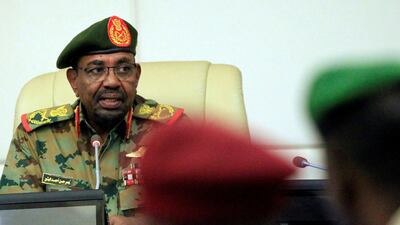Western powers including the US rebuked Sudan on Tuesday for its "return to military rule" after President Omar Al Bashir imposed a state of emergency and appointed army officers to top government posts.
Mr Al Bashir declared a year-long nationwide emergency on Friday after a deadly crackdown failed to suppress weeks of protests against his rule.
He also dissolved the federal and provincial governments and appointed 16 army officers and two officers from the powerful National Intelligence and Security Service as governors for the country's 18 provinces.
The president went further still, banning all unauthorised rallies and giving sweeping powers to security forces to raid buildings and search people.
The US, Britain, Norway and Canada expressed concern over his directives.
"Allowing security forces to act with impunity will further erode human rights, governance and effective economic management" in Sudan, the four countries said in a joint statement issued by their Khartoum embassies.
"The return to military rule does not create a conducive environment for a renewed political dialogue or credible elections," the statement added.
In power since a 1989 coup, President Al Bashir is considering running for another term in polls due next year, after winning multi-party contests in 2010 and 2015.
The four nations also called on Khartoum to release all detainees held during the ongoing protests.
"We also note continuing reports of unacceptable use of live fire, beating of protesters and mistreatment of detainees," said the statement.
"Political consensus cannot be achieved by imprisoning, shooting and criminalising peaceful protesters," it added.
Sudanese officials have denied using live ammunition against protesters and blamed the violence on "infiltrators" among the demonstrators. Officials have also said 31 people have died in protest-related violence since demonstrations began on December 19, although Human Rights Watch says at least 51 have been killed.
The four countries warned that "the government of Sudan's response to these protests and the actions of the military-led government will determine our countries' future engagement" with Khartoum.
The US is in talks with Sudan to remove the African country from its list of state sponsors of terrorism.
In October 2017, Washington lifted a 20-year-old trade embargo against Khartoum, but kept the country on its terrorism blacklist along with Iran, Syria and North Korea.
Mr Al Bashir has blamed US policies towards Sudan for the country's economic woes, although many accuse his administration of mismanaging the economy.
The demonstrations in Sudan were initially sparked by a government decision to triple the price of bread, but they swiftly escalated into rallies against the president.
On Tuesday, the president pushed on with top-level reshuffles, including in the military.
The army said in a statement that its deputy chief of staff, General Essameddine Mubarak, had been appointed as the new state minister of defence.
It said the new deputy chief of staff would be General Hashim Abdelmotalieb.
In a separate statement, the judiciary said it had set up "special emergency courts" across all states to investigate violations of the state of emergency, with offenders facing up to 10 years in prison.

